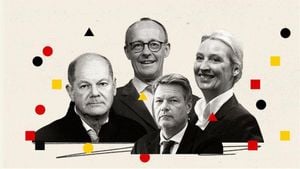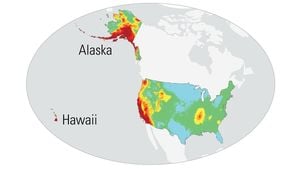Germany's political scene has dramatically reshaped following the February 23, 2025, federal election, where the Christian Democratic Union (CDU), led by Friedrich Merz, emerged victorious. This election is notable not only for the CDU’s return to prominence but also for the historic gains made by the far-right Alternative for Germany (AfD) party, marking its strongest showing since World War II.
Exit polls indicated the CDU received nearly 30% of the vote, placing it back at the helm of German politics after facing significant challenges during Olaf Scholz's center-left government. The far-right AfD garnered around 20%, doubling its previous electoral performance and capturing the second spot. Meanwhile, the Social Democrats (SPD) suffered what is considered their worst postwar performance, registering about 16% of the votes, nudging them down to third place. The Greens trailed with about 13.5%.
The election could not have come at a more turbulent time for Germany, as it grapples with economic uncertainty, rising energy costs, and growing public discontent. Voter frustration was palpable; many expressed concerns about immigration policies rooted in Chancellor Angela Merkel’s legacy, which opened Germany’s borders to more than a million refugees during the migrant crisis of 2015. Since then, immigration has remained a hot-button issue, fueling AfD’s rise.
Josef Schuster, president of Germany's leading Jewish organization, voiced his alarm, stating, "It must concern us all... right-wing radicalism and neo-Nazism, which plays on people’s fears." Olaf Scholz, lamenting the results, emphatically stated, "I will not accept it and never will," opposing any future cooperation with AfD, highlighting the long-standing consensus among traditional parties to maintain a ‘firewall’ against the far right.
Friedrich Merz, aware of the challenges awaiting his coalition formation process, expressed the need for rapid action. "This is a bitter election result for my party," he remarked, pledging to bring change and address voters' concerns particularly around energy costs, which have skyrocketed due to Germany's transition away from fossil fuels.
Protests against the far-right party have echoed throughout the country, even leading up to the election. Public frustrations were reflected by concerned voters like Nadine Nimczyk, who said, "The future of the country will no longer be democratic," expressing fears around the surge of far-right sentiment.
The dynamics of the next German government are complex. The leading CDU, along with its sister party, the Christian Social Union (CSU), must navigate coalition talks carefully. Potential scenarios point to coalition agreements either with the SPD or the Greens, both of whom add varying degrees of complexity with their differing ideologies.
The stakes are high for Merz as he looks to shape Germany's future, distancing the new government's policies from the legacy of Merkel. Voters have made it clear they are eager to shift government priorities, signaling support for firmer immigration controls and economic reforms aimed at alleviating living costs. This necessitates balancing the far-right's increasing influence against the traditional values held by other political factions.
Notably, the election has seen endorsements from international figures like Greek Prime Minister Kyriakos Mitsotakis, who congratulated Merz, signaling possible shifts not just within Germany but across Europe as well. He remarked, "A decisive victory for our political family, for Germany, and for Europe," reflecting the shared sentiment among conservative leaders across the continent.
With many voters citing law and order as their primary concern, the AfD has tapped skillfully onto these sentiments, capitalizing on fears around unresolved immigration issues. Supporters of Merz demand not only swift action to curb illegal immigration but also economic strategies to counteract stagnant growth and high energy prices.
Internal party dynamics will also play a significant role as Merz attempts to unify his coalition. Critics and former Merkel loyalists have already raised concerns over his reliance on the far-right for parliamentary support. Protests surrounding this issue have showcased public unease, as many view the hard-right rhetoric with skepticism and fear.
Political analysts have characterized this election as indicative of broader trends across Europe, where far-right parties have gained traction. The AfD, now sitting as the biggest opposition party, will continue to influence the discussion on migration policies and the government’s relationship with the European Union. The party has consistently used emotionally charged language around such topics to draw support, creating what some experts describe as a "platform for resentment and anger."
With the dust still settling on this contentious election, it is clear Germany now stands at a crossroads. The balance of power is shifting, and how the new government manages rising tensions will be pivotal. The present coalition negotiations will be closely watched, not just by German citizens but by observers across Europe, marking this as one of the defining moments for Germany's political future.
The question remains: will the new government uphold the democratic values and historical lessons learned from the past, or will it drift toward the populist strategies employed by far-right counterparts? The answer could reshape not only Germany’s direction but the entire European sociopolitical fabric.



